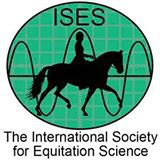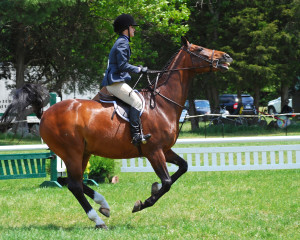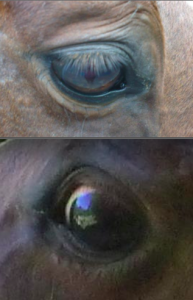The International Society of Equitation Science considers itself a do-good organization. Its mission statement  includes improving horse welfare. Indeed, the group has used science to successfully lobby against hyperflexion and nose band tightness, and for that, it should be applauded.
includes improving horse welfare. Indeed, the group has used science to successfully lobby against hyperflexion and nose band tightness, and for that, it should be applauded.
But some ISES member research makes us cringe. Check out their track record on bolting horses, blanket choice, and music’s effect on horses.
- Now, fresh from presentations at their conference in Vancouver, British Columbia, researchers are concluding that martingales (also known as tie downs) are good for horses’ welfare:
Dr. Hayley Randle and others noted that novice riders tend to pull hard or unpredictably on the reins. But they found that when beginners rode horses with tie downs, those riders pulled less on the reins. Therefore, said the researchers, tie downs may actually benefit the horse. Read more here.

An unhappy horse, equipped with martingaleTherefore, said the researchers, tie downs may actually benefit the horse.
Please, no!!
Scores of respected horsemen and women have discouraged the use of head-restricting equipment. In one recent article, Martin Black addressed the unfortunate use of tie downs: “The problem from our perspective is our horse’s head is up and the mouth is open. The problem from the horse’s perspective is in our hands and/or our weight…When we can take responsibility for causing the problem, [it] can go away without all the gimmicks.”
The problem with this study? It gives novice riders a pass. It reminded me of dog owners who use pronged collars instead of working on teaching their dogs not to pull. Or, teachers who encourage keyboard use when students’ handwriting is sloppy. It’s a lazy, myopic perspective that values the quick fix over the slow, sticking process of wisdom gained. Read what one renowned scientist has to say about Point of View.
A better study could have addressed instructor strategies for teaching rein use:
— How about starting beginner riders without reins?
— How about teaching riders that reins are for steering, not stopping?
— How about starting beginners on less sensitive horses?
- In another ISES report, researchers from three countries measured the “eye wrinkles” of horses in varying emotional states and concluded: “some characteristics of eye wrinkling were affected by different emotional states.”
We wonder if the researchers know about the trigeminal nerve, one of the few cranial nerves that has both motor and sensory components. It runs down the horse’s face and affects its eyes, cheeks, jaw and muzzle.
When a horse is stressed, the nerve’s activation may be represented by an entire cluster of features including a tight muzzle, clenched jaw, and tightness around the eyes (whites of eyes).
Good  horsemen and women learn to watch for trigeminal and facial nerve activation as reliable indicators of the horse’s anxiety level. Read more about that here.
horsemen and women learn to watch for trigeminal and facial nerve activation as reliable indicators of the horse’s anxiety level. Read more about that here.
There are bigger problems with the dissemination of ISES reports:
- When measured against the hierarchy of evidence, most ISES research falls very short. Read more about what makes for good science in this AAEP report.
- The Internet doesn’t discriminate between good and bad science and often the ‘sexiest’ reports get the most traction.
- Most horse folks find it hard to tell the difference between good and bad science.
I talked with Warwick Schiller about ISES and science. The accomplished Australian conducts clinics internationally and will be at the Equine Affaire this fall. “I’m not against scientists. I’m against poor science and calling it gospel,” he said. “You get called wrong because a guy with six letters after his name said so.”
Interested in what makes for good animal science?
Check out this article on animal intelligence.
Check out Fred Holcomb’s Dwell Time results, an example of good science.
